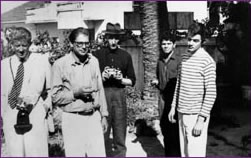Beat generation poetry

THE FLOWERING OF the Beat Generation in the late fifties was the result of a very slow germination process. The four original Beats, Allen Ginsberg, Jack Kerouac, William Burroughs, and Neal Cassady, met in New York in the late forties. More than a decade would pass before Ginsberg's Howl ignited the explosion that would coalesce the disparate ideas, the sense of lifestyle, and the philosophical musings into a full-fledged literary movement.
The term beat was first used by Jack Kerouac in 1948 while talking to his friend Clellon Holmes: "So I guess you might say we're a beat generation." Holmes later wrote an article for the New York Times Magazine, entitled "The Beat Generation," saying, "It involves a sort of nakedness of mind, and, ultimately, of soul, a feeling of being reduced to the bedrock of consciousness." Soon Ginsberg and Kerouac were emphasizing the "beatific" qualities of the word, making of it a mystical, transcendental experience. Ginsberg explained, "The point of Beat is that you get beat down to a certain nakedness where you actually are able to see the world in a visionary way, which is the old classical understanding of what happens in the dark night of the soul." Howl led the way; Kerouac's On the Road followed with unprecedented media attention; Burroughs' Naked Lunch, banned and vilified, broke through the barriers of censorship, and a literary movement was born.
Howl and Other Poems
Allen Ginsberg ORIGINALLY READ FROM the manuscript at the now famous Six Gallery reading of November 22, 1955, Howl was an immediate and resounding success, first among the poets associated with San Francisco's literati and then throughout the hip community at large. Lawrence Ferlinghetti, owner of the City Lights Bookstore, had recently begun publishing avant-garde poetry; he wrote to Ginsberg that night saying, "I greet you at the beginning of a great career. When do I get the manuscript?" Published in 1956 as Number Four in the Pocket Poets Series, Howl led to the arrest in May 1957 of Ferlinghetti and City Lights bookstore manager Shigeyoshi Murao on charges of selling obscene material. Against the background of heightened publicity, Judge Clayton W. Horn, a Sunday School bible teacher, found Ferlinghetti and Murao not guilty in October 1957. With a foreword by William Carlos Williams, Howl, often referred to as the "Beat Manifesto," was the first successful publication of the Beat era, and became one of the most influential books of twentieth century American poetry.